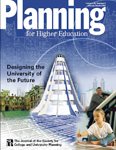- Integrated Planning
Integrated Planning
Integrated planning is a sustainable approach to planning that builds relationships, aligns the organization, and emphasizes preparedness for change.
- Topics
Topics
- Resources
Resources
Featured Formats
Popular Topics
- Events & Programs
Events & Programs
Upcoming Events
- Community
Community
The SCUP community opens a whole world of integrated planning resources, connections, and expertise.
- Integrated Planning
Integrated Planning
Integrated planning is a sustainable approach to planning that builds relationships, aligns the organization, and emphasizes preparedness for change.
- Topics
Topics
- Resources
Resources
Featured Formats
Popular Topics
- Events & Programs
Events & Programs
Upcoming Events
- Community
Community
The SCUP community opens a whole world of integrated planning resources, connections, and expertise.
 Planning for Higher Education Journal
Planning for Higher Education JournalEnlarging the Academic Community: Creating Retirement Communities Linked to Academic Institutions
 From Volume 34 Number 2 | January–March 2006By Andrew Harrison, Tien-Chien Tsao
From Volume 34 Number 2 | January–March 2006By Andrew Harrison, Tien-Chien Tsao
Institutions referenced in this resource:
University of California-Davis, University of Michigan-Ann Arbor, Notre Dame CollegeThis article explores a major opportunity that universities have to capitalize on their existing property portfolio to both earn additional revenue and enhance the quality of the student and staff experience: the creation of university-linked retirement communities. We examine this opportunity in the context of demographic and educational trends in the United States and United Kingdom and identify the factors that act as catalysts for universities to create these communities. We then describe a conceptual framework for university-linked retirement communities that categorizes communities in terms of the level of university involvement in the community and the level of care provided to the residents. We next place university-linked retirement communities in a broader context of social housing trends in Europe and suggest that it may also be possible to create more socially inclusive university-linked learning-centered communities that provide additional opportunities for universities to capitalize on their resources and expertise while contributing to the surrounding community.
MEMBERS ONLY
Attention Members: Log in to access this item.Not a member? Join now to access this article and all journal articles for free. - Topics
- Topics


